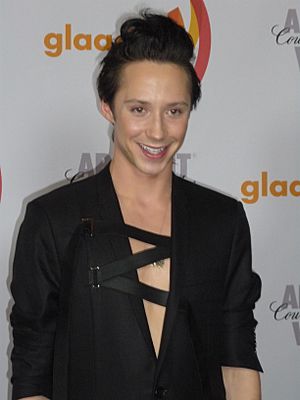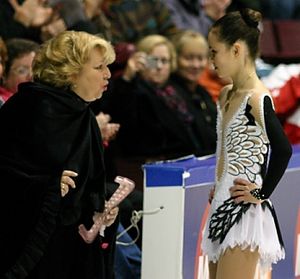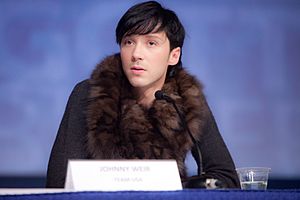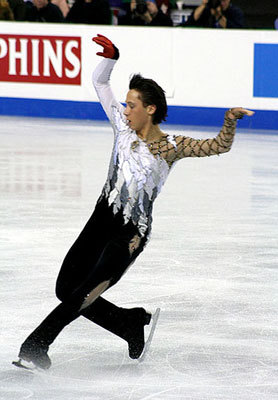Johnny Weir facts for kids
Quick facts for kids
Johnny Weir
|
|||||||||||
|---|---|---|---|---|---|---|---|---|---|---|---|

Weir at the 2010 GLAAD Media Awards
|
|||||||||||
| Born |
John Garvin Weir
July 2, 1984 |
||||||||||
| Occupation |
|
||||||||||
| Height | 1.72 m (5 ft 7+1⁄2 in) | ||||||||||
|
|||||||||||
John Garvin Weir (born July 2, 1984) is a famous American television commentator and a former figure skater. He competed in two Olympic Games (2006 and 2010). Weir won a bronze medal at the 2008 World Championships and was the 2001 World Junior Champion. He was also the U.S. National champion for three years in a row, from 2004 to 2006.
Weir was known for his artistic and graceful skating style. He often designed his own unique and eye-catching costumes. After retiring from skating in 2013, he became a popular commentator for NBC, working alongside fellow skater Tara Lipinski.
Contents
Early Life and Skating Beginnings
Johnny Weir was born in Coatesville, Pennsylvania. Before he was a skater, he was a talented horseback rider. He won several equestrian competitions with his pony, Shadow.
He became interested in figure skating at age 11 after watching Oksana Baiul win at the 1994 Winter Olympics. He taught himself to skate on a frozen cornfield near his home. At age 12, he began taking lessons and quickly learned difficult jumps. His family moved to Newark, Delaware, so he could be near his skating rink and coach, Priscilla Hill. He decided to focus completely on skating.
Competitive Skating Career
Junior Champion
Weir started competing a little later than most elite skaters, but he improved very quickly. In 1998, he placed third at the U.S. National Championships in the novice division.
By the 2000–2001 season, he was competing against older skaters. At age 16, he won the gold medal at the 2001 World Junior Championships. This made him one of the top young skaters in the world.
U.S. Champion Years

The 2003–2004 season was a major turning point for Weir. He began training with the famous Russian coach Tatiana Tarasova. She helped him become more confident and powerful on the ice.
That year, at age 19, he won his first U.S. National title at the 2004 U.S. Championships. He skated a clean and elegant program that earned him a standing ovation. He went on to win the U.S. title again in 2005 and 2006. He was the first man to win three U.S. titles in a row since Brian Boitano in the 1980s.
One of his most famous programs was skated to The Swan. He wore a special costume with one red glove to look like a swan's beak. The program showed off his artistic style and became a fan favorite.
Olympic Dreams and Rivalries
Weir competed in his first Olympic Games in 2006 in Turin, Italy. After the short program, he was in second place behind Russian skater Evgeni Plushenko. In his free skate, he made a few mistakes and finished in fifth place overall.
For the next few years, Weir had a famous rivalry with fellow American skater Evan Lysacek. At the 2008 U.S. Championships, they tied for first place. Lysacek was given the gold medal because he had a higher score in the free skate. Later that year, Weir won a bronze medal at the 2008 World Championships, his first and only world medal.
Weir qualified for his second Olympics in 2010 in Vancouver. He skated two strong programs and earned personal best scores. He finished in sixth place and was a favorite with the crowd.
Retirement from Competition
After the 2010 Olympics, Weir took a break from competing. He returned in 2012, hoping to make the 2014 Olympic team. However, injuries made it difficult to train.
In October 2013, Weir announced his retirement from competitive skating. He then began a new career as a television commentator.
Broadcasting and Later Career

Weir joined NBC as a figure skating analyst for the 2014 Sochi Olympics. He was paired with his good friend and fellow skater Tara Lipinski and commentator Terry Gannon. The trio became very popular with viewers for their fun and insightful commentary.
Weir and Lipinski have since become NBC's main figure skating commentators. They have covered multiple Olympics, World Championships, and other major events. They are also known for their bold and matching fashion choices.
In 2023, Weir announced he would retire from performance skating. He also planned to open a skating academy in Delaware to train future champions.
Personal Life
In 2012, Weir married Victor Voronov. The couple divorced in 2014.
Weir is very close friends with Tara Lipinski. He served as her "bridesman" at her wedding in 2017. As of 2021, he lives in Greenville, Delaware.
Images for kids
-
The men's podium at the 2006 Skate Canada International. From left: Daisuke Takahashi (2nd), Stéphane Lambiel (1st), Johnny Weir (3rd).
-
The men's podium at the 2004 NHK Trophy. From left: Timothy Goebel (2nd), Johnny Weir (1st), Frederic Dambier (3rd).
-
The men's podium at the 2008 Grand Prix final. From left: Takahiko Kozuka (2nd), Jeremy Abbott (1st), Johnny Weir (3rd).
-
The men's podium at the 2009 NHK Trophy. From left: Johnny Weir (2nd), Brian Joubert (1st), Michal Březina (3rd).
-
The men's podium at the 2009–10 Grand Prix of Figure Skating Final. From left: Nobunari Oda (2nd), Evan Lysacek (1st), Johnny Weir (3rd).
-
The men's podium at 2008 Skate America. From left: Johnny Weir (2nd), Takahiko Kozuka (1st), Evan Lysacek (3rd).
-
The men's podium at 2008 NHK Trophy. From left: Johnny Weir (2nd), Nobunari Oda (1st), Yannick Ponsero (3rd).
-
The men's podium at the 2008 World Championships. From left: Johnny Weir (3rd), Jeffrey Buttle (1st), Brian Joubert (2nd).
See also
 In Spanish: Johnny Weir para niños
In Spanish: Johnny Weir para niños
 | Frances Mary Albrier |
 | Whitney Young |
 | Muhammad Ali |

















